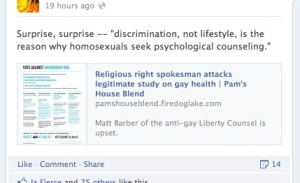GLBT Study Misrepresented
Posted: April 17, 2012 Filed under: Misreporting 2 CommentsPrivate Lives 2 Study Misrepresented
This is an interesting forensic analysis of how an urban myth can develop.
Early in April, an Australian study on the local GLBT community, named Private Lives 2 was released. This 75 page report is subtitled on the cover The second national survey of the health and wellbeing of gay, lesbian, bisexual and transgender (GLBT) Australians, and was produced by the Australian Research Centre in Sex, Health & Society (ARCSHS), at La Trobe University. You can access the report in full, by clicking on the name of the study, above.
Within two weeks, people were misrepresenting what the study found. Randy, a resident of Texas, cited an article about it and wrote on his facebook wall;

Surprise, surprise — “discrimination, not lifestyle, is the reason why homosexuals seek psychological counseling.”
But this was not a firm conclusion from the study. Randy was mis-citing a blog post from Pam’s House Blend, written by Alvin, a gay blogger who has been previously criticised for publishing one sided and misleading information, and who on this occasion again blurred the line between fact and opinion. Alvin’s post was about a post on the topic on another website, and although Alvin quoted his source post almost in full, he also added the comment that;
“Apparently a new study has confirmed what many of us knows when it comes to how homophobia hurts gay health”
Alvin used the word “apparently”, as is appropriate, but unfortunately Alvin also used the word “confirmed”, which I suggest is something that the authors of the study did not claim, and probably didnt intend. An article on the website of the University responsible described the link between homophobia and poor mental health as a “likely outcome”, not one that was “confirmed”. Some others would probably interpret the report to not even indicate it was a “likely outcome”. Personally, I think the report lacks substantiation to even suggest the link as strongly as they do. Those involved in studies know that it is often difficult to prove causation in disciplines such as health (EG, many studies showed that women who were taking combined hormone replacement therapy also had a lower-than-average incidence of coronary heart disease, suggesting that one impacted the other, but it was eventually found that the therapy was not the cause of the lower incidence, but rather those using the therapy tended to be wealthier and accordingly led healthier lives). Sometimes the best one can hope for in studies like these, is to highlight a correlation – determining causation may not be realistically achievable. The commentary in the blogs Ive mentioned added to the confusion though, and Alvin’s article left the reader under the impression that the report weighed up whether the poor mental health is a result of “lifestyle”. The report doesnt even contain the word “lifestyle”. The word “lifestyle” was injected into the debate by this website, which Alvin had used as source material.
So the sorry trail of confusion went like this;
1. A study about the experiences of Australian GLBT people was released. The study included the suggestion – but made little attempt to prove – that discrimination/abuse led to poor mental health.
2. A website mentions the article and casts doubt on the above suggested causation. The website suggests “lifestyle” as an alternate cause of the poor mental health.
3. Another website then presents a comment on the earlier article, and introduces the idea that the study may have actually confirmed the cause of the poor mental health.
4. A facebook user, then reads this conjecture, and kindly decides to simplify the argument even further, by quoting; “discrimination, not lifestyle, is the reason why homosexuals seek psychological counseling.” The facebook user effectively copied and pasted those words. However, what he copied was only part of the sentence from his source. The sentence in the source material was rather long, but it was uncertain. It said; “… a study of Australian homosexuals that suggests discrimination, not lifestyle, is the reason why homosexuals seek psychological counseling …” 70 or more people then read that facebook posting, and clicked on the ‘like’ button, probably not taking the time to look into whether it was a well founded conclusion.
Regarding the video you shared, that “preacher” is not representative of the Spirit of Christ and the Bible. This kind of irresponsible behavior is what makes addressing LGBT issues extremely volatile. I condemn his behavior and language in the strongest terms. Such name calling is inconsistent with the nature of Jesus. I agree with you 100% that our words of expressing the love of God must not be empty. Thanks for your comments and as true believers in Christ, we will govern our words with actions to ensure that it is consistent with Scripture and the Spirit of Christ.
Yes the video featuring Rosey, that I posted to your site. Youre welcome.